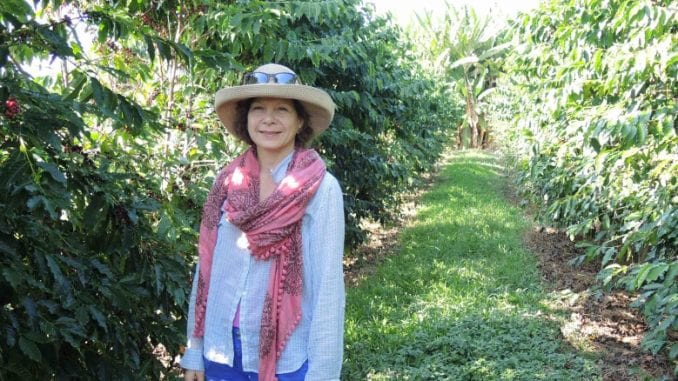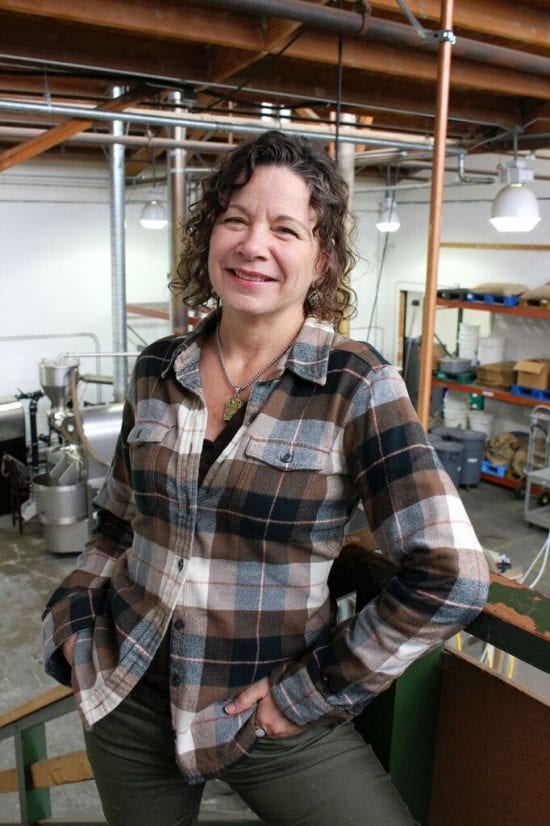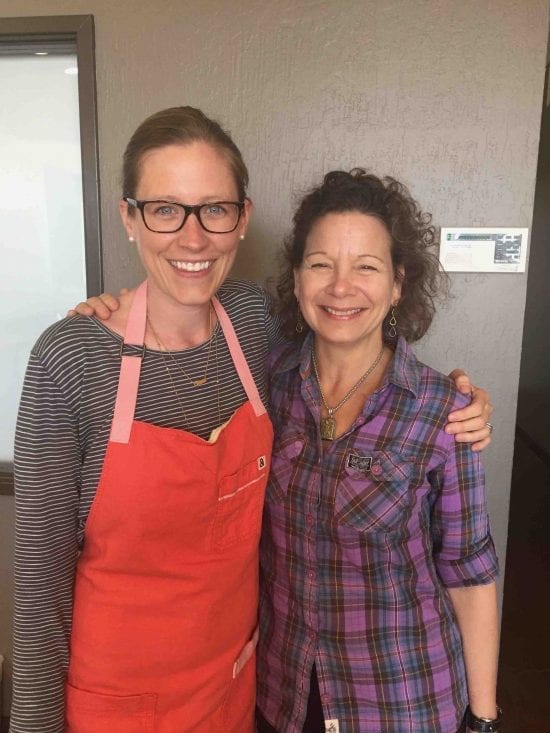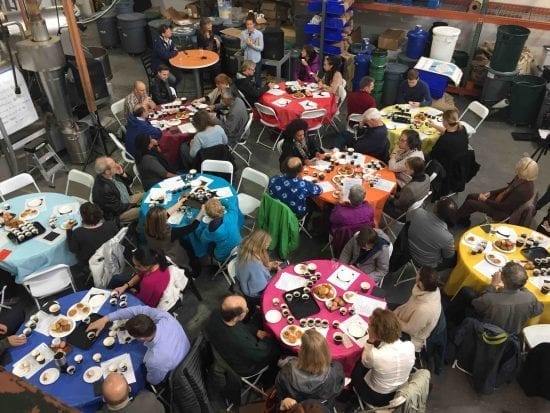
Floy Andrews, co-founder of Bay Area CoRoasters, talks to us about her past life as a lawyer, what she knows about the sharing economy, and why people need to pay more for coffee.
BY ASHLEY RODRIGUEZ
BARISTA MAGAZINE ONLINE
Floy Andrews is the co-founder of Bay Area CoRoasters, a communal co-roasting space based in Berkeley, Calif. But coffee is still a new endeavor for her. She shares with us how her background in law informs her perspectives, her goals for consumers, and how the co-roasting model has evolved over time.
Ashley Rodriguez: Could you talk a little bit about your career pre-coffee?
Floy Andrews: I was a lawyer before coffee. Actually, I still am a lawyer … but don’t do much of that now. I left that work in 2013 and headed to Manhattan. At 50 I went back to school at Columbia to study Bioethics, a fascinating subject. I’m still involved with that as a volunteer on the ethics committee at Summit Hospital in Oakland. I help make personal healthcare decisions for people who can’t and have no one else to help them. It’s fulfilling work.
I practiced law for 16 years, in Los Angeles, with an international law firm and then as a vice president at Irvine Company in Orange County. I left because—for the final act of my career—I want work that allows for deeper connections. I need to feel engaged in the world, that my time more directly impacts people living their lives. My favorite job until now was waiting tables.
When I arrived in Berkeley from New York, my first feet-on-the-ground work was helping the owner of Runway, a tech incubator in the city (lawyer work again). That work gave me a good look into the sharing economy. I had no idea at the time that the view into Runway would have such impact on my next professional incarnation. That’s how life is. Never assume you’re wasting time. It’s all about showing up and choosing to be present. The rest is the miracle.

AR: How did you get into coffee?
FA: In 2015, coffee chose me. I did not know what to say, so I nodded ‘yes’ and got to work. Most of the best things so far have found me.
Shortly after wrapping up the work with Runway, my close friend Joan Blades, co-founder of MoveOn.org and Living Room Conversations, introduced me to her good friend, Tim Hansen, a part-owner of the roastery that is now CoRo. Tim was looking for someone to help him make good use of the amazing CoRo space. He mentioned the idea of renting out the space to other coffee roasters. I thought, ‘Right: Share the space!’ After a little research and a good meeting with CoRo’s chairman, we were underway. Since then, for me it’s been all coffee all the time—better than lawyering, that’s for sure. I even got my Q-Grader certification last summer with Gather Coffee Company.
AR: What were some of the challenges getting CoRo going? What were some surprises?
FA: It’s a new concept. Our first challenge was as basic as determining how to structure the memberships to strike the right balance that allowed a sustainable model for CoRo, while keeping costs at a level that worked for small-batch roasters. Gabe Boscana, now of Máquina Coffee Roasters, was our first member. Gabe has very deep roots in coffee and was a huge help. He walked us through the business concept and advised on what a roaster would need. He also introduced us to Dani Goot who was really excited about the co-roasting model; he was our first director of operations. He was the one who insisted that the Bay needed a neutral place for our large and growing coffee community to come together and share ideas. We listened. He quickly brought local and farther-flung coffee people through the door.

Other challenges have included: determining when to buy new and expensive equipment, like our two new Loring roasters and our second weigh & fill packing machine, and getting permits to build the CoRo Coffee Room (a café attached to the roastery that will feature CoRo members’ coffees on a rotating basis). Buying the equipment was resolved by trusting in the vision and ordering the new equipment before it was certain we needed it. The second challenge is ongoing. There’s nothing really to do but be patient and persist.
AR: How have your skills in other industries influenced the way you approach coffee? What stands out as important to you?
FA: I’m pretty focused. Lawyers have to be focused. They are trained to keep their eye on the end game. In a world where so many distractions, many valuable, are constantly being served up in alluring packages like Instagram, Facebook, via email, and where so many lovely coffee people come and go throughout the day, the ability to focus on the goal is a gift of sorts. At the same time, it’s the connection I was seeking when I left the law.
A lot of coffee people who’ve come up in coffee don’t know what it’s like to really make a good living. They feel lucky just to be doing coffee. We are lucky to be doing coffee! And we all deserve to make a good living! For specialty coffee to be sustainable, we all need to make a good living. That means, in this Bay Area economy, the consumer needs to pay more for specialty coffee. I see that as one of my overarching goals here—to help consumers understand the value of great coffee and to convince them to pay more for that value. Then there’ll be plenty for everyone along the value chain. The CoRo Coffee Room, in addition to promoting our members’ coffees, will promote consumer education to help push these boundaries further.
AR: What were the goals of CoRo when you first opened? Have those goals evolved?
FA: Our initial goals were to share the roastery so others who wanted to roast coffee could get into the game without making a prohibitive and risky investment, and to cover our costs, pay ourselves, and deliver a little extra to the owners in the process.
I’ve personally been excited about two other specific objectives. First, educating consumers, as mentioned above. Second, finding ways to bring importers and producers and small-batch roasters like CoRo members together. Toward this end, we developed the CoRo Green Wall, where importers leave small samples of various current offerings for members and others to take, roast, and cup. It really fosters new connections between small roasters and importers.

AR: Where do you see coffee growing?
FA: Here’s a big generalization, but there’s truth in it. New coffee lovers live their values and care about life experience much more than stuff. They prefer to spend money with organizations that reflect their viewpoints and lifestyles, even if that means paying a little more. And they are willing to change it up and try something new. In fact, often they prefer that.
For craft specialty coffee people and everyone along that value chain, that spells opportunity. Everyday, a new coffee drinker becomes a coffee lover, and coffee lovers like trying new coffees—a new origin, a new brand of coffee, a new roast profile, a new brew method, a new coffee concoction, a new café, new kinds of milk, etc. Craft coffee is coming of age. As this transition happens across the country, new and creative coffee brands reflecting their local customers’ values and tastes will be born, new and innovative cafés will spring up, more consumers will travel to origin to see and taste the coffee in country, and coffee is just going to be so fun!

